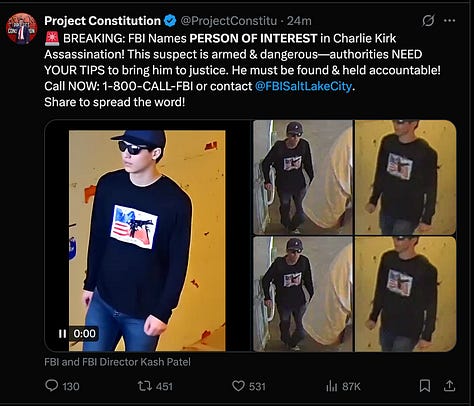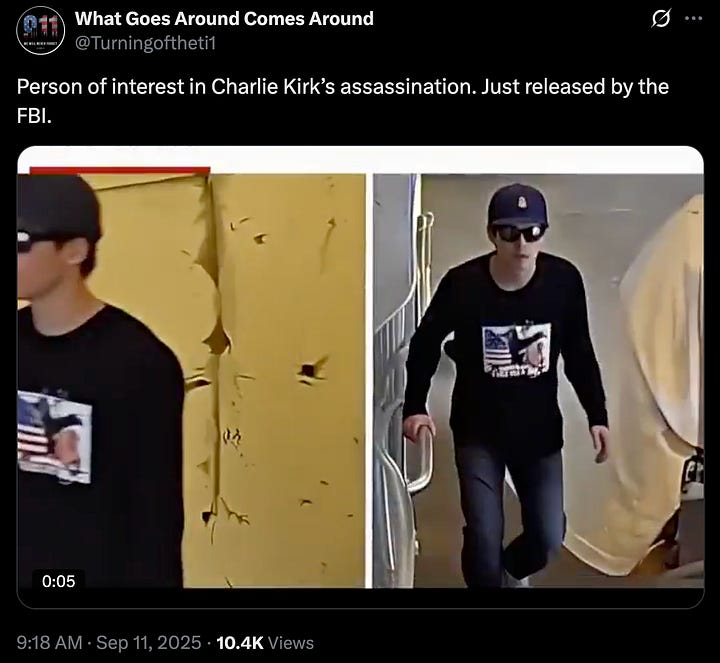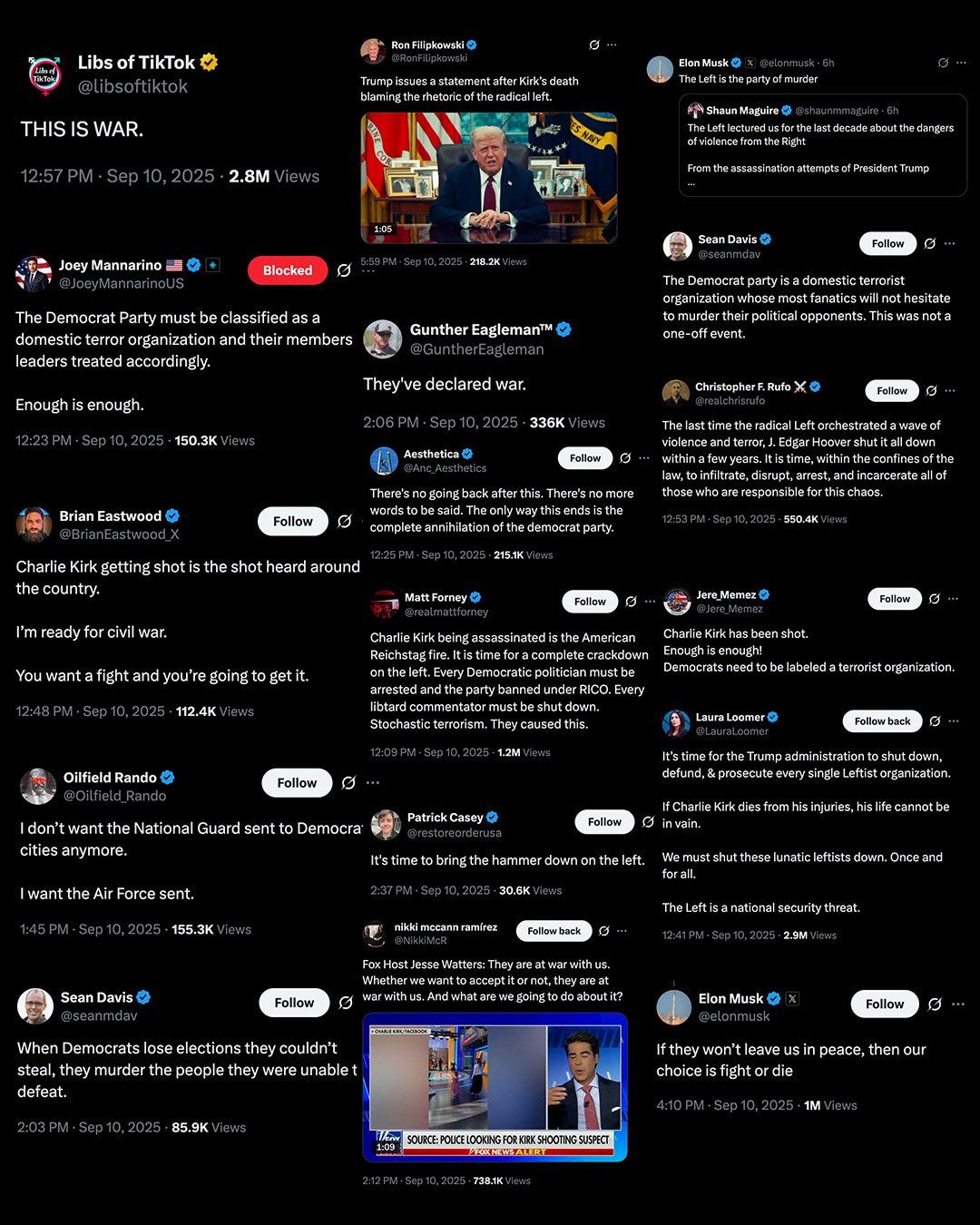The killing of Charlie Kirk and the end of the "global town square"
On the state of X, AI "enhancements", and the balkanization of Twitter into anti-social media.
Twitter never was a “global town square,” as much as pundits and executives liked the metaphor. Elon Musk liked it enough that, after buying the site and rebranding it X, he had the official account reiterate the idea. But “town square”? Not really. Twitter was a large website that, by virtue of its early-mover advantage, its success in the network effect sweepstakes, and its savvy public relations campaigning, captured enough of the world’s commentariat to resemble a flattened version of one, for a time. But it was always an ad-supported platform where opaque algorithms determined who saw what, in what chronology, and who benefited most from the resulting engagement.
At Twitter’s peak, it really did have legacy media outlets and citizen journalists, conservatives and liberals, celebrities and heads of state, shitposters and academics, and so on, sharing the same platform and feedspace. This could give us, the users, the impression that we were “participating” in a world event, or at least the processing of one, by publishing our character-limited takes on the matter as it was unfolding. It was a prospect alluring enough to draw dedicated users, like me, and perhaps you, to the well, time and again. It’d be hard to tally how many News Events I engaged as a rubber-necker, a journalist, or a poster, by refreshing Twitter futilely and endlessly. I’m very obviously not alone here. A lot of good words have been written and extensive studies have been conducted in service of trying to discern what that practice even was.
But I hadn’t even fully realized how much I’d mostly stopped processing news in this way—shoulders hunched and tense, squinting into the feed, agitated, feeling a compulsion to ‘weigh in’ despite being acutely aware that we are all being prompted by a website’s UX design to feel that precise compulsion, and wanting the shares and validation anyway—until the gruesome assassination of the right-wing provocateur Charlie Kirk brought me, with millions of others, right back into its maw.
It’s not that there hadn’t been other notable and wide-ranging atrocities recently, obviously, that I and millions of others have watched slack-jawed in anger through an app. But a truly and awfully ideal Social Media Event demands not just that you feel outrage, or even respond to others’ outrage, but that you succumb to that compulsion to join in, to simulate a kind of participation in history. It demands that you feel a blind urge to “do something” and transmute it onto the screen, to make your statement. (I saw a lot of users were commenting on how it was as if people were issuing their own press releases, which was apt, and it’s always been a bit like that.) To correct the big accounts that are obviously getting it wrong and “call out” the ones espousing hate, and so on.
The killing of a rightwing political activist known for trolling liberals, as well as for his enormous presence on the very sites his death was experienced through, more than fits the bill. It’s well-known at this point that platforms like X reward shocking graphic video, inflammatory speech, and political attacks with virality; the shooting of Kirk had all of the above packed into its initial singularity. It became the first time in months, maybe even years, that I lost the day to scanning and posting on social media. It might well be one of the last.
To me, anyway, it was a clarifying event with regard to the current State of Social Media, three years after Musk’s takeover of Twitter, its remaking as X, and its subsequent balkanization into various platform fiefs. It dispelled some curiously persistent delusions in the process, and zealously introduced the new elements that seem to me to be poised to limit the further effective simulation of a user’s participation in history. I came away with a few lingering thoughts and conclusions, which I’ll drill into below.
The conceptualization of Twitter or X as a “global town square” can be dismantled for good
“AI enhancement” is the new, anti-social version of the crowd-sourced social media manhunt
Bluesky, as a left-liberal coded X alternative, has created a useful new kind of ‘other’ for online political projects
Let’s get into it.
The “democratic” “town square” that never was, is dead
It was always, in hindsight, an enormously dubious proposition that Silicon Valley social media platforms would help foster democracy in any serious or sustained manner, despite the fleeting example of the Arab Spring tech companies wore like a badge for years afterwards. Autocrats soon learned that controlling social media was easy enough; you can always play the refs, and barring that, pull the plug. And if you own the thing, well, you can do a lot more than that.
Elon Musk’s X has become a case study in how a social media network with tens of millions of users can be remade in the image of the man behind the control board, by removing content moderation, restoring users banned for hate speech, introducing pay-to-play incentives, and routinely signaling, by personal example, what kind of content the platform is for.
Yesterday, at 12:27, Musk tweeted “The Left is the party of murder,” before there was any evidence at all about the killer’s identity, or regarding his motives or ideological leanings, or that “The Left” is in fact a political party. Nonetheless, it helped pave the way for a stream of vitriol and calls to violence from some of X’s biggest accounts.
In an essay that now seems quaint despite being published just weeks ago, the editor of a new liberal magazine, The Argument, inaugurated the publication with a call for its new readers to stay on X, for the sake of debate: “Twitter is — without question — the most influential public square we have… Those who leave Twitter are sacrificing their ability to advocate for the change they seek.” Scanning the posts above, from some of the largest accounts on the platform, as well as from its owner, I hope it’s obvious enough that the only reason these folks are taking to any kind of public square is to assemble a firing squad.
On a more granular level, multiple reports have confirmed that Musk instructed X’s engineers to boost how far his own posts travel, and who knows how many friendly accounts he’s extended the favor to, or how else he’s tinkered with the algorithm, in ways less obvious than giving rise to MechaHitler. Meanwhile, users, typically his fans, who pay for blue checkmarks, get their posts elevated by the algorithm in replies, effectively stamping out any hope for organic debate. And the drumbeat of anti-left, anti-Democrat, anti-woke, and anti-migrant posts from the platform’s top account, Musk’s, have indelibly created a culture that should disabuse anyone of the notion that this is entire configuration is something to be argued against. X has become a vehicle for power, in other words, not persuasion. And the anti-MechaHitler side doesn’t have any.
Users, myself included, who nonetheless felt compelled by watching the rage fomenting on the platform after Kirk’s murder, to post anything attempting to counter the gathering “this is a war and the Democrats/left must be extinguished” narratives, were predictably ignored, mocked, and steamrolled, or worse. Right-wing activists are now taking the social posts of people they believe to be “celebrating” Kirk’s death—many are just posting the activists’ own past quotes—entering them into a database, and posting their personal details online.
There was no meaningful debate, besides perhaps between fellow traveler liberals, and certainly no detectible impulse towards democracy. Whether or not it’s *ethical* to stay on X is another question, but the aftermath of the Kirk killing shows us why we’d do well to dismantle our model of X as a place where debates are had, needles are moved, and political progress is possible.
AI slop is further degrading information quality and giving rise to antisocial crowd-sourced manhunts
In the earlier days of social media, after a tragedy, users would take to the platforms to scour the footage and photos of the event for clues. Most famously, in the case of the Boston Marathon Bomber, a subreddit that dubbed itself ‘Find Boston Bombers’ crowd-sourced the investigation to amateur sleuths at home. It wound up declaring a few innocent people as suspects, spurring the media to show up on at least one poor bystander’s front lawn. The “suspects” were harassed online and otherwise made miserable. Ultimately Reddit was forced to apologize.
The intent may have been noble, or not, but either way, it was worse than useless. It impeded the real investigation and ruined some real people’s lives for a while. It was a function of social media that we had to learn to guard against, to prevent amateur information from dubious provenances from entering the chat. Now, of course, there’s a brand new vehicle for information degradation proliferating on the platforms
As Futurism reported, AI chatbot products, especially Grok, were sharing false information about Kirk’s killing:
When one user asked, for instance, if Kirk could have survived the gunshot wound, Grok responded in a cheery tone that the Turning Point USA founder was fine.
"Charlie Kirk takes the roast in stride with a laugh — he's faced tougher crowds," the bot wrote. "Yes, he survives this one easily."
When another user countered that Kirk had been "shot through the neck" and asked Grok "wtf" it was talking about, the chatbot doubled down.
"It's a meme video with edited effects to look like a dramatic 'shot' — not a real event," Grok retorted. "Charlie Kirk is fine; he handles roasts like a pro."
Then, on Thursday, when the FBI released images of the suspected shooter, social media users took to the platform not to pool clues, but to ‘enhance’ the image using AI. I’ve assembled some of the examples below; there were also video renderings that depicted the shooter walking up the stairs.








This is, of course, once again, worse than useless. Some of these users may, like most of the Boston marathon bomb sleuths, just be trying to help, but they’re assuming that ChatGPT is going to work like the “AI” they see on TV procedurals, and “enhance” or “clean up” a photo, when it is of course assembling a new image from scratch, based on the pixels put into its system. (Gizmodo’s Matt Novak has a good and more thorough explainer of why this practice is so absurd.)
An AI image generation system, cannot, for instance, give us any actual information about what the suspect looks like without sunglasses on.
Now, this was somewhat fringe stuff, though there were big accounts participating, but the practice was also often shouted down. Still, there were at least a few cases where users were taking a screenshot from one of the AI image generators and using it to draw conclusions, and you can see how in the future this all might become more problematic. And I think it’s worth noting that the previously bad practice of working socially to find and compile evidence is giving way to the new bad practice of generating your own evidence, with a new tech product at hand.
The combined effect, and the omnipresence of AI on the platforms, leads users to expect a breakdown in information quality—to the point that Trump’s address on Kirk’s death, which was recorded and uploaded straight to social media, was widely criticized for potentially being AI-generated. In fact, it probably was either just hastily cut together, or employed an AI editing tool. But the Trump admin clearly loves AI and making AI-generated media, it would ultimately be unsurprising if it used ChatGPT to shit out a video statement. The White House X feed itself, after all, is another artifact highlighting the decay, and increasing anti-sociality, of social media.
The social media balkanization and the vilification of Bluesky is complete
Shortly after Kirk’s killing, a blogger in Musk’s orbit, Tim Urban wrote that “Every post on Bluesky is celebrating the assassination. Such unbelievably sick people.” Musk quoted the post, and insisted “they are celebrating cold-blooded murder.” The evidence supplied was a few tiny accounts and dumb posts with one to zero likes apiece.
Another prominent conservative commentator replied to AOC’s call for nonviolence by saying, “Your followers are celebrating Charlie Kirk's assassination all over Bluesky. Hundreds of thousands of bloodthirsty Democrats, delighted by the political violence that you've incited.” The Atlantic staff writer Thomas Chatterton Williams called this purported celebration of violence “unconscionable.”
Of course, it wasn’t really happening. Not on any scale that was materially different from what was taking place on X or elsewhere, anyway. I spent a considerable amount of the week on Bluesky, too, watching the trending topics, searching keywords, doomscrolling, etc. (I also have dummy accounts on both platforms not algorithmically tailored to my typical browsing habits.) I can say with confidence that the reaction was similar on both platforms—the vast majority of posts ranged from ‘violence is never the answer’ to ‘nothing good will come from this’ to highlighting pointed quotes of Kirk’s about gun violence. You could find a few on both platforms along the lines of “he deserved it” but they were the obvious and clear minority.
It didn’t matter. To many, “Bluesky” has become an ideological construct of its own, the place where “the intolerant left” has allegedly gone to live in its bubble. (This assumption seems flawed to me, as, based on a purely anecdotal taxonomy, it seems it’s mostly progressives and left-liberals on Bluesky, and that a lot of the more traditionally Marxist left has stayed on X, though there is certainly plenty of overlap.)
That construct is now being used, in part, to justify the project outlined above by all those big rightwing accounts on X—all those “vile” posters on Bluesky ostensibly celebrating Kirk’s death are the reason that LibsOfTikTok, Matt Walsh, Elon Musk, and whoever else, must now go “to war.” The othering of the users of an entire social media platform is an especially useful rhetorical move, because X users don’t even have to leave to leave the platform to see if what the vilifiers are saying is true, and they most likely won’t. For centrists like Chatterton, meanwhile, it’s useful as a means of elevating one’s sense of reasonableness and pragmatism, over the hordes gnashing their teeth, again, just off-platform.
The biggest and most powerful accounts on X were never going to listen to the input of the accounts now posting on Bluesky, no matter where they were doing said posting. What matters more than anything—certainly more than the persuasive capacity of clever users—is that X is owned by a person with a material and political interest in highlighting certain views (Bluesky, after all, is also an X competitor), and cultivating his platform in a specific way, accordingly. Posts are peripheral; what matters is power. It’s always been thus, now it’s unambiguous.





Twitter indeed never was a "global town square", but even if it had been, I agree with Alex Balk's Second Law of the Internet:
The worst thing is knowing what everyone thinks about anything.
(https://www.theawl.com/2016/11/the-spirit-of-the-internet)
Balk didn't elaborate much, but the general reason is that "everyone" includes a lot of loud-mouthed idiots.
Like many other hosts of "user-generated content", Twitter was at its mostly-harmless best early on. When I joined in 2007, it was almost unknown outside of Greater Silicon Valley (i.e., the subculture centered on Silicon Valley, which at the time I felt a professional obligation to pay attention to). For awhile, I found it mildly entertaining and occasionally useful, although I always thought the character limit was ridiculous and encouraged thinking in soundbites. By 2012, however, it had become infested with bots and trolls, so I stopped bothering with it. Of course, it went on to become the far more putrid cesspool it is now.
I think John Herrman captured much of the spirit of what might be called middle-period Twitter - after the early innocence but before the current Elonshittification - when he wrote (at *The Awl*), "Who tweets? Brands, and people who believe themselves to be brands." I'm stubbornly resistant to becoming a brand; I loathe the concept, and I've managed to get along fine without it. So I don't miss Twitter, even the relatively benign Twitter of 15 years ago (although I realize it was useful to journalists).
As for the "AI enhancement" nonsense, you can blame *Blade Runner* and a multitude of idiots who don't understand the difference between reality and fiction.
Well, damnit, someone has to say this. Maybe the kid in custody actually shot Charlie Kirk. But given the immediate, intense reaction of the right, I have to ask not only whether someone not trained as a sniper could kill someone in one shot from that distance but the critical question, Who Benefits? Trump's sending the national guard and a hugely beefed-up ICE into just cities with black mayors and Dem governors of the states, saying things like "Chicago will find out why we call it the Department of WAR!!", his whole contingent constantly engaging in violent rhetoric while accusing the virtually nonexistent left of being violent--these people are clearly aching for a civil war. Why, I'm not sure, but the fact that the right is enormously better armed and more aggressive than the left--or rather, the Democrats, who they confuse with the left--means they can expect to "win"--whatever that means. I guess a lot of what it means is that Trump has his excuse to declare yet another state of emergency and cancel the midterms, use the army and his ICE militia to control dissidents in otherwise clearly unconstitutional ways.
So maybe they're seizing on that kid actually having killed Kirk, maybe that came as a surprise they were ready to instantly leap upon to further their agenda...or maybe it was a CIA or Mossad sniper, sent in to take out one of a dime-a-dozen rightwing trolls so they could roll out this reaction and use it to justify an intense, violent crackdown.